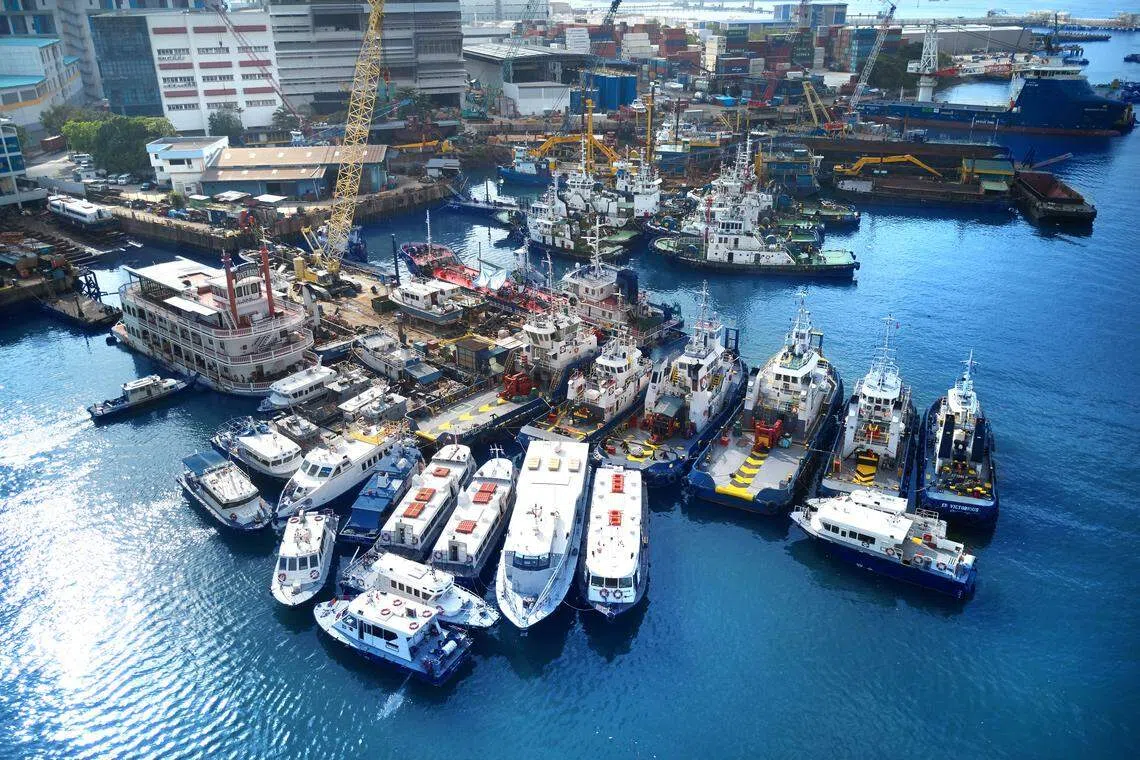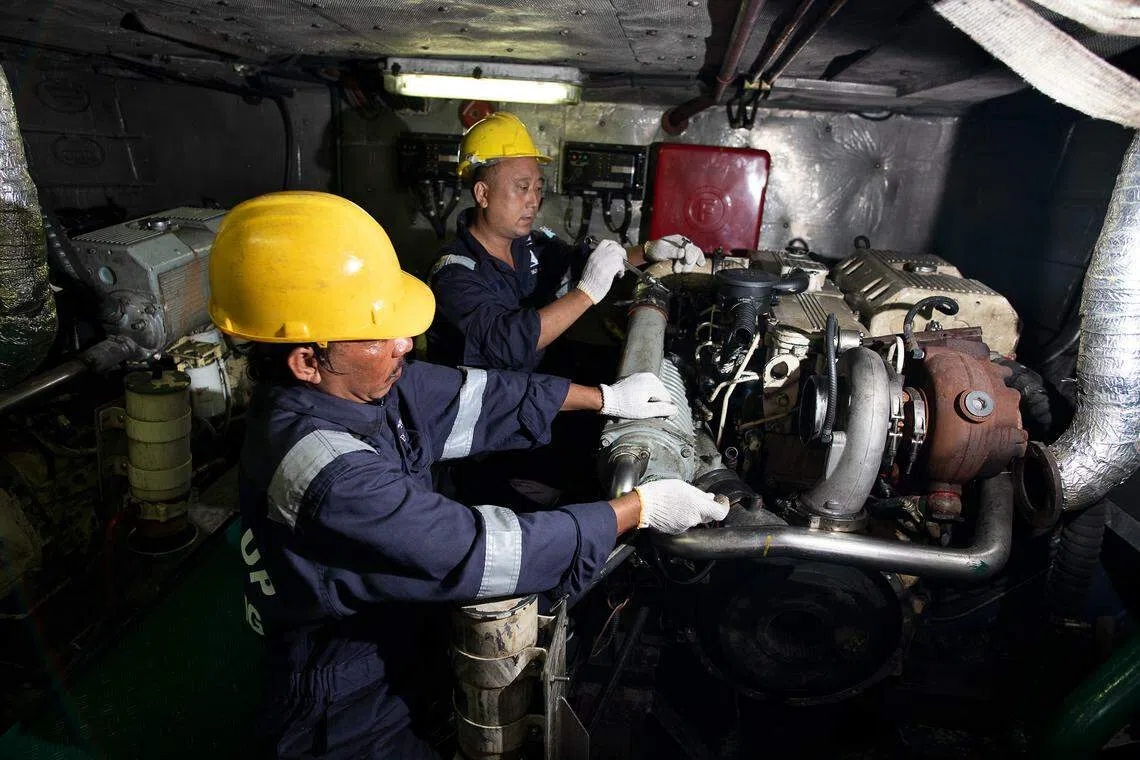Sustainability paves the way forward
Tommy Phun of Eng Hup Shipping says the goal is to become a leading regional maritime solutions provider, powered by innovation

Tommy Phun, scion of family-owned marine services company Eng Hup Shipping, recalls spending time aboard vessels as a child, being brought into the wheelhouse and engine rooms by the company's long-serving captain. This bred in him a love of maritime. Joining the business after he obtained his business management degree at the Singapore Management University was a natural step.
"My grandfather was a boatman so I grew up hearing many stories of him at sea, and I spent most of my childhood onboard vessels… running along ports and rivers with my sister. It was like our playground. I was inspired very early to be part of the maritime industry."
He got his feet wet in the business much earlier than many of his peers. From his army days, he began work on a proposal for the company to acquire a shipyard, a project which lasted until his university days. "The company wanted to buy a shipyard so that we could have our own base, especially for seafarers onboard our vessels. I was assigned to the project. It was very challenging and stressful because I knew nothing about how to do a business plan, how to even do modelling and speak to partners, clients and vendors. It took me a long time to learn the ropes, but I was fortunate to have the right team as well. We had to present our proposal to the directors of EDB, JTC and at that time Spring Singapore."
The project came to fruition with the acquisition of Bee Sin Shipyard in 2012. "Bee Sin means a lot to me, because I played quite a big role in it from the beginning."

Phun is director of Eng Hup Shipping and Bee Sin Shipyard. Eng Hup counts its origin in the 1950s, but the company was founded in 1986 by his father, Thomas Phun, who is managing director. His mother Justina Lim is director and younger sister Lyn is head of corporate services. Today, Phun drives the group's efforts in three key areas that promise to be transformative – automation, digitalisation and decarbonisation. A key plank of the latter is the electrification of vessels.
Efforts in the areas are set to create waves across the marine industry, typically staid and bound by tradition, and promise to sharpen Singapore's competitive edge in the global maritime arena.
Navigate Asia in
a new global order
Get the insights delivered to your inbox.
"We're at the stage of strategic transformation. Our goal over the next 5 to 10 years is to become a leading regional maritime solutions provider powered by innovation. Maritime has been transforming over the last couple of years. With the support of government agencies, many companies like ours are turning to technology to increase the efficiency of our operations and processes. Many of our systems used to be manually intensive, but digitisation has helped us to reduce time and effort on simple tasks."
Eng Hup's efforts are gaining recognition. Phun was earlier this year appointed by the Maritime Port Authority as a digitalisation ambassador to share best practices on how technology can be harnessed for the industry. Last year, Eng Hup also joined a consortium led by Keppel Offshore & Marine to help drive maritime electrification. It is currently retrofitting an existing passenger ferry to become fully electric-powered as part of a plan to develop Singapore's first comprehensive electric vessel supply chain by 2025.
Eng Hup's journey in terms of digitalisation and sustainability is not without challenges. In digitalisation, for instance, Phun says the company's ambition was for an all-inclusive command screen to picture the entire fleet at a glance, with an ability to reflect the maintenance status and give instructions, among others.
"But the system didn't work, because we made the mistake of biting off more than we could chew. This taught us a very valuable lesson. Instead of attempting to create a whole new digital system from scratch, which would be costly and time-consuming, we changed our approach to tackle low-hanging fruit and take it one small step at a time."
Low-hanging fruit includes the mundane process of booking vessels, which can now be done digitally via an app. Checking in passengers at ferries is also now done by facial scanners, instead of manually recording passenger details. There is also predictive maintenance, which enables it to anticipate breakdowns.
"Behind the many successful digitalisation stories that we hear, there are many companies who start the process but give up along the way. Companies need to understand that digitalisation is not a magic wand. It's a long-term process which requires patience and perseverance before we can reap the benefits."
Maritime electrification also has its challenges. Unlike electric vehicles which are already commercialised, it is relatively early days in the quest for the electrification of the maritime sector. Charging infrastructure, energy storage and solutions for long sea voyages are just some issues to be addressed. "We have a fleet of over 70 vessels. Not all can be electrified; we'll need to do this in stages... The supply chain must be ready for it."

Electrification takes its first step in pleasure craft for leisure and passenger ferries for short trips. "For the waters, the charging infrastructure is an issue everyone is trying to solve. As an extreme example, container ships that sail for the US or Japan - there is no way to electrify them because the energy requirement is so huge … That's why we start with a passenger ferry as a way for us to develop competencies and a track record, and to allow clients to see a workable solution."
The company is among the pioneer participants in the LowCarbonSG programme, which provides tools and guidance on measuring and monitoring its carbon emissions. It is also working with partners on R&D to develop technologies to electrify its fleet. "We're hoping to build a wider Singapore ecosystem to cater the increasing demand for green shipping solutions."
Its quest for sustainability and ever-increasing degrees of digitalisation is shaping up to be part of the group's bedrock, particularly in terms of its purpose. The twin objectives are helping to bridge the classic divide between younger and mature employees, for instance. And sustainability is increasingly a magnet for younger recruits who seek careers that wield a greater impact. "Young people are very good with technology and mature employees have 20 to 30 years of experience which is invaluable. It's interesting when we can bring the two groups together."
"The younger generation believe very strongly in the green movement. Those in university and polytechnic want to feel they're making a difference; they want to save the environment. (Sustainability) gives them a bigger vision and that's what we aim for in a company."
The group is looking forward to the resurgence of economic activity post pandemic. In the midst of Covid, several projects were suspended. The group however did not retrench its staff of over 200. Focus on digitalisation emerged as a silver lining. Repair work, for instance, was done remotely via video calls. “Covid forced us to adapt and change, and it actually raised staff productivity and forced people to pick up new skills. It put us in a stronger position."
Phun looks to his late grandfather as a role model; Phun Boon Yan was originally from Jinmen, an island off Taiwan. He sailed across the South China Sea to Singapore and became a boatman along the Singapore river. He recounts a story, told by his grandmother, of Phun who chose to stay on his wooden unsheltered tongkang, sitting with a plastic sheet atop customers' goods to ensure the goods were sheltered. "What I have learned from these stories is that he had an indomitable spirit against all odds and unwavering dedication to his work. This inspires me to continuously push the boundaries with resilience."
Eng Hup espouses core values of responsibility, respect, reliability and resourcefulness. To those, Phun layers other dimensions. "I believe strongly in incorporating traditional values into the company, such as grit and the perseverance to always move forward, and humility to always remain teachable. And to have a purpose far larger than ourselves. I believe this will guide us to do business in the right way and will leave a lasting legacy for future generations."
BFI@SMU message:
While family-owned businesses can be misconstrued as staid, we find that the long-term perspective commonly held by family owners is a strong motivator for next-gen leaders' transformative efforts. In particular, the transformation to sustainable business models will help to preserve the family's legacy.
Professor Kenneth Goh, Academic Director, Business Families Institute, V3 Group Fellow in Family Entrepreneurship, Singapore Management University
“"I believe strongly in incorporating traditional values into the company, such as grit and the perseverance to always move forward, and humility to always remain teachable. "”
Tommy Phun
Decoding Asia newsletter: your guide to navigating Asia in a new global order. Sign up here to get Decoding Asia newsletter. Delivered to your inbox. Free.
Copyright SPH Media. All rights reserved.

